By PRASHALAN GOVENDER
This week, the World Health Organization (WHO) declared Monkeypox “a public health emergency of international concern”. But, many people still do not know what it is, how it is contracted, and whether or not it is fatal.
DISCLAIMER: THE INFORMATION PROVIDED HERE IS BASED ON WHAT HEALTH OFFICIALS KNOW SO FAR ABOUT THE VIRUS.
What is it?
Monkeypox is a virus which is a less deadly cousin to smallpox. It was first transmitted to humans by animals when humans had direct contact with infected animals or their fluids. Despite the name, the virus is believed to have originated from animals much smaller than monkeys – namely, certain squirrels, rats and dormice, which are found in West and Central Africa.
This is not the first time the virus has made itself known; the first human case was recorded in 1970 in the DRC. However, this is the first time that the virus has been capable of being spread so widely. There have been two confirmed cases of monkeypox in South Africa so far.
What are the symptoms?
- A rash which could look like a serious of pimples or blisters on the face and body
- Headache
- Muscle and backache
- Chills
- Exhaustion
- Swollen lymph nodes
How is it contracted?
- Close contact with an infected person (hugging, kissing, and sex).
- Skin-to-skin with an infected person. Places like clubs, raves, and parties where the space is closed and there is a large number of people, could lead to skin-to-skin transmission.
- Sharing personal items or items that have been in contact with an infected person’s skin (such as towels, bedding, and clothing).
Is it fatal?
No one has died from this outbreak to date. But, monkeypox can lead to complications like pneumonia and infections in the brain (encephalitis) or eyes, which can be fatal.
Prevention and treatment
According to the Centers for Disease Control and Prevention (CDC), there’s no proven treatment for monkeypox specifically, but since monkeypox is closely related to smallpox, the smallpox vaccine, antivirals, and vaccinia immune globulin can protect people from getting monkeypox.
The WHO says that those below age 40-50 are unlikely to have been vaccinated against smallpox, as vaccination ended in 1980.


